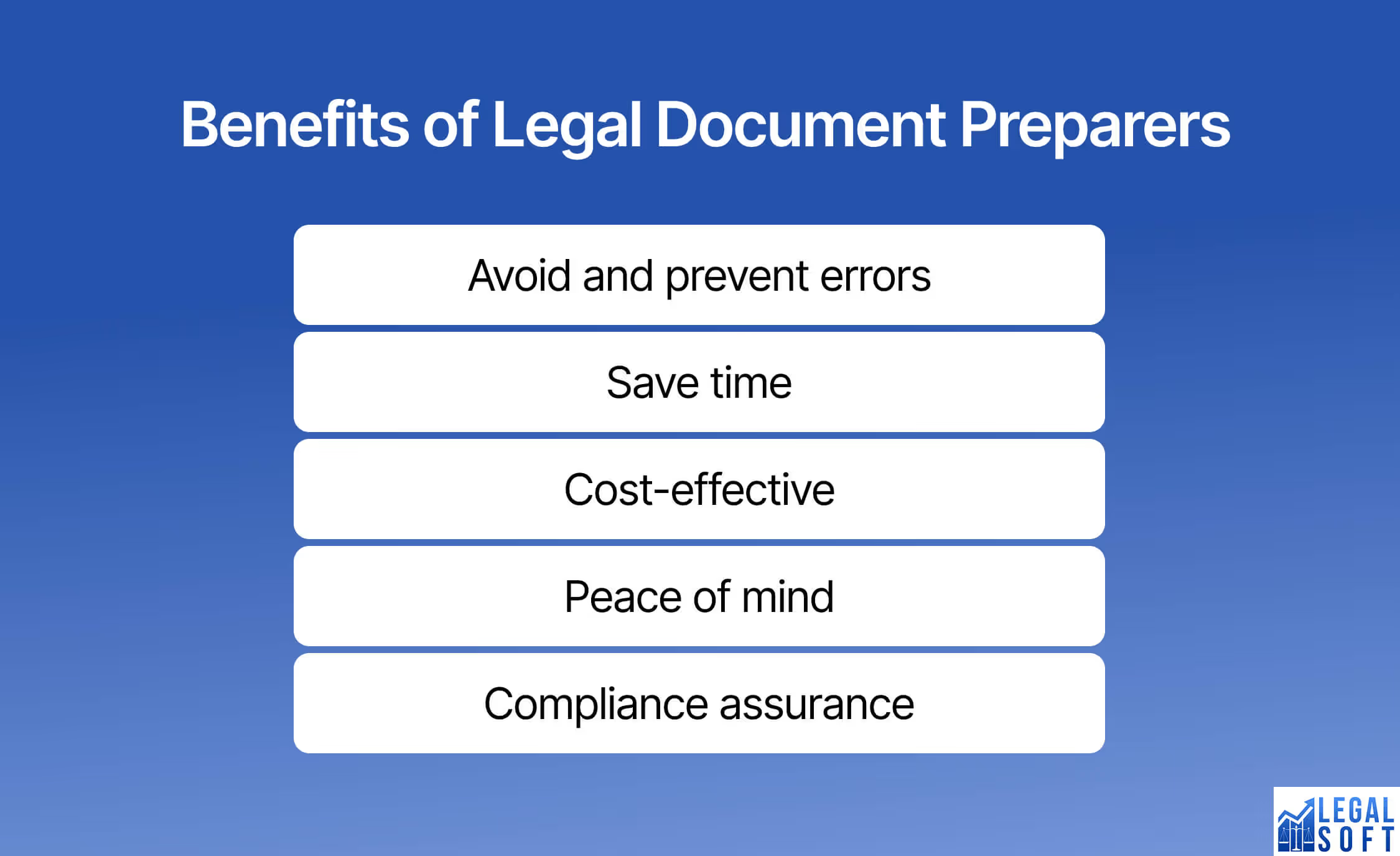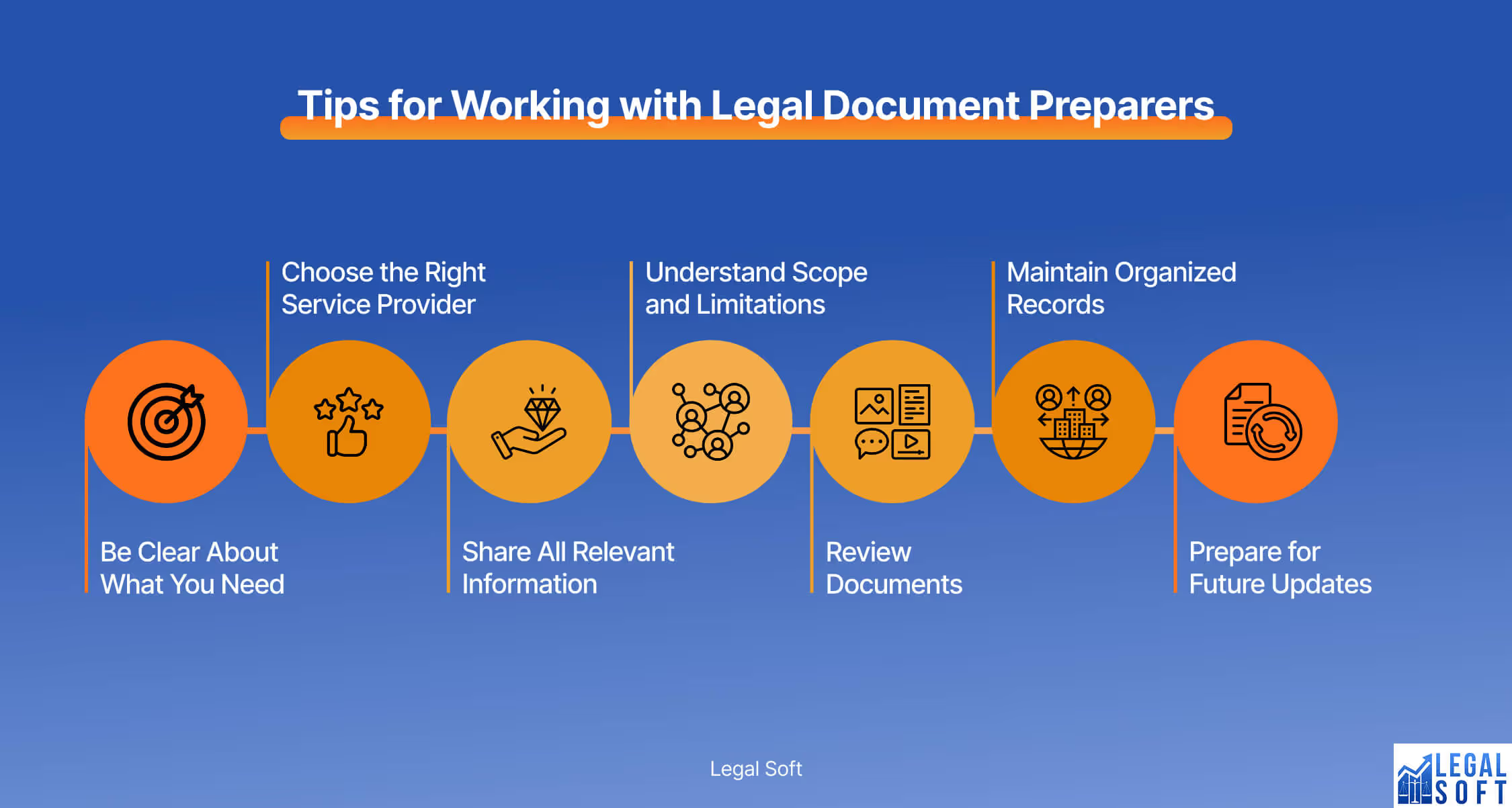Legal services form the foundation of a functioning society by ensuring proper justice and representation. For instance, the United States legal services sector was valued at approximately USD 1.05 trillion in 2025 and is projected to keep rising in the coming years, potentially reaching USD 1.30 trillion by 2030. This growth highlights the increasing importance of legal services in the modern world.
One of the most important elements in the legal process is document preparation. Legal documents contain the specific components and details of the case that help attorneys, clients, and courts understand matter clearly. They are the building blocks of cases, contracts, and compliance—but creating them correctly requires specialized knowledge and expertise.
While many assume that only attorneys can prepare legal documents, there's actually a dedicated profession focused specifically on this task: Legal document preparers. This guide provides a clear understanding of their role, the services they offer, and best practices for working with them effectively.
What is a legal document preparer
A legal document preparer (LDP) is a non-attorney professional who prepares legal documents for clients. They may work under the supervision of an attorney or as an independent professional authorized to provide specific legal services directly to the public. Their role includes preparing and filing legal documents, such as contracts, wills, powers of attorney, and other court-related documents. However, they are not permitted to provide legal advice, represent clients in court, or practice law.
To become a legal document preparer, one must meet specific educational and professional requirements that vary by state. For example, in California, this role is formally recognized as a legal document assistant (LDA), which requires registration with the county clerk, posting a bond, and renewing registration every two years in compliance with state law. Other states may impose different regulations, qualifications, or licensing processes.
Defining legal document preparation
Legal document preparation is the service of creating, drafting, and filing legal documents. It requires an understanding of legal terminology, laws and regulations, and the ability to produce documents that outline legal rights, obligations, and processes. While this service does not constitute legal advice, it focuses on the technical and procedural aspects of creating legally sound documentation.
What legal documents can they prepare?
Legal document preparers provide a wide range of document preparation across many practice areas. Some specialize in specific categories, while others cover multiple types of paperwork. Knowing these categories can help you identify which services best match your needs.
Here’s a breakdown of the common documents legal document preparers are authorized to prepare:
The benefits of legal document preparers

Time is your most valuable resource. Legal document preparers provide advantages for individuals and law firms requiring assistance navigating legal paperwork. Here are their key benefits:
- Avoid and prevent errors: These professionals know what to look for and can help you catch mistakes before they become problems. Even a single error in a legal document can cause delays or lead to rejection.
- Save time: Legal forms can take hours or even days to figure out if you’re unfamiliar with them. Legal document preparers handle these tasks daily and can complete them much faster.
- Cost-effective: They offer an affordable alternative to hiring a lawyer, especially if all you need is a properly filled-out document.
- Peace of mind: With a legal document preparer, you don’t have to stress about formatting, deadlines, or what goes where. You’ll know your documents are being handled professionally.
- Compliance assurance: Laws and requirements change frequently, and they're not always easy to track. Legal document preparers stay updated with current regulations to ensure your documents are legally binding and comply with the latest standards.
Pro tip: Saving a few dollars or rushing through paperwork may seem harmless at first, but cutting corners can lead to serious consequences. In short, while the “quick and cheap” route may be tempting, the smarter choice is investing in professional help from someone who knows how to get it right.
The limitations of legal document preparers
While legal document preparers provide valuable support, their role comes with specific limitations. They must operate within strict legal boundaries and cannot provide certain services that only licensed attorneys are allowed to perform.
- No legal advice: They can prepare documents based on your instructions, but they cannot interpret laws, advise on legal options, or explain the consequences of your choices.
- Cannot Represent in Court: They are not authorized to represent clients in court or during legal proceedings.
- No Discretion in Legal Strategies: They cannot recommend which specific forms or legal approach would be most appropriate for your situation. Clients must decide which documents they need before requesting preparation.
When do I need a legal document preparer?
Consider reaching out to one if:
- You know which documents you need but want them prepared correctly.
- You’ve already decided on a course of action but are unsure how to complete the paperwork.
- You need help navigating court filing requirements and procedures.
- You want to ensure your documents comply with current formatting and legal standards.
- You’d like guidance through the paperwork process step by step.
- You’re comfortable making your own legal decisions but need professional document preparation.
- You want to save money compared to hiring an attorney for document-only services.
How to work effectively with legal document preparers

1. Be clear about what you need
Gather all necessary details before starting. This typically includes personal identification, case information, financial records, and any documents related to your matter. Being prepared helps speed up the process, prevents errors, and can reduce costs.
2. Choose the right service provider
Research potential providers thoroughly. Look for relevant certifications, experience, and positive client reviews. Select a preparer who uses advanced software to make the process easier and more secure. For specific legal issues, choose someone who specializes in that area of law.
3. Share all relevant information
Being transparent is essential. Don’t hold back details because even small things you think might be irrelevant can affect your documents. Every information you share is kept confidential, and full disclosure ensures precision.
4. Understand the scope and limitations
Clarify exactly what's included in the service you're purchasing and recognize when you need additional legal counsel. Some services only create the documents, while others may also assist with filing, notarization, or related tasks. Keep in mind that document preparers cannot provide legal advice or represent you in court.
5. Review documents
Double-check everything before signing or filing. Even with professional support, you remain responsible for your legal documents. If something is unclear, ask questions until you’re confident in the final document.
6. Maintain organized records
Keep both digital and physical copies of drafts and final documents in secure but accessible locations. Follow filing instructions carefully—many documents have strict deadlines, fees, or format requirements.
7. Prepare for future updates
Legal documents often require revisions as circumstances change. Ask about the process and cost for updates. Preparers that offer client portals, e-signature options, and digital storage can make ongoing management much easier.
The fee structure for a legal document preparer
The cost of hiring a legal document preparer is typically based on a flat fee or an hourly rate structure. Flat fees are often used for straightforward documents, while hourly rates apply to more complex services.
It’s important to discuss your specific needs in advance so you fully understand the pricing structure. This will help you budget appropriately and compare different providers.
Factors that may affect the cost
There are several factors that can influence how legal document preparers charge :
- Specific Service: Preparation time varies by document type.
- Complexity: More complex matters may require additional forms, resources, or time, which can increase costs.
- Location: Providers in urban areas may charge more than those in rural areas due to higher living costs.
Final notes
In conclusion, a legal document preparer is an invaluable resource, offering cost-effective support for both individuals and legal professionals. By handling the preparation of legal paperwork, they provide efficiency and peace of mind—saving clients the time, effort, and stress of navigating complex legal requirements alone.
Hiring a legal document preparer is a smart investment, especially when done thoughtfully. Quality legal services don’t have to be expensive or complicated. For instance, Legal Soft offers access to a network of vetted legal document preparers at a fraction of the cost of in-house staff. With an initial consultation, you can compare multiple options and determine the best path forward.

Frequently asked questions
Can a non-lawyer prepare legal documents?
Yes. In many jurisdictions, non-lawyers may provide legal document preparation services as long as they do not offer legal advice or represent clients in court.
What is the difference between a paralegal and a legal document preparer?
A legal document preparer focuses solely on preparing legal documents and often works independently. A paralegal, on the other hand, works under the supervision of an attorney and assists with a broader range of legal tasks.
Do I need to hire an attorney if I use a legal document preparer?
It depends on your situation. If your matter is straightforward, you know which documents you need, and you don’t require legal advice, a legal document preparer may be sufficient. However, if your case is complex or you need guidance on legal strategy, you should consult with an attorney.








